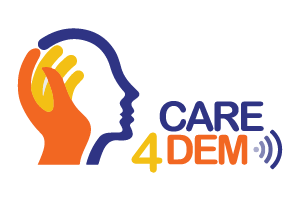By supporting facilitators, the CARE4DEM project aims to support the development of mutual aid groups for carers. Innovative tools for facilitators have been developed during this project, likely to help them develop their role.
The Mutual aid groups facilitators’ profile
Currently, mutual aid groups are implemented by many different kinds of professionals, from health care or social workers to adult educators. These professionals are often called ‘facilitators’, as they guide the learning process within the group.
There is no such thing as an empirical or scientific profile of the competences that these facilitators might have. This output intends to provide a complete profile covering the entire set of competences a facilitator might develop in order to achieve the highest potential as a mutual aid group facilitator. It includes knowledge, skills and attitudes, providing behavioural descriptors of such items, besides an overall definition of each competence.
This is expected to introduce an added value among organisations inside and outside the partnership as it will provide support in the selection of facilitators, but mostly in the self-development of facilitators – allowing for a better fit between person and job place, as a mean for job satisfaction and motivation.
A detailed report on the methodology and references used to design the Mutual Aid Groups facilitators’ profile and the Online Self-Assessment Tool is available and can be downloaded here: [download id=”35078″].
Read also the User’s Manual that can be downloaded here (English version):[download id=”35047″]. This document describes how to use the Competence Profile in practice, in combination with the Online Self-Assessment Tool. The User’s Manual is also available in all the languages of the project:
[download id=”35100″]
[download id=”35103″]
[download id=”35107″]
[download id=”35110″]
The CARE4DEM Online Self-Assessment Tool
The online Self-Assessment tool was designed to help the facilitators gain a better understanding of their personal facilitation tendencies, which greatly affect their interaction with the mutual support group they facilitate. The content of the Self-Assessment is in line with the Shorter Competence Profile. The online Self-Assessment tool is easy to use: the user is invited to situate him/herself between two available options for a series of items, by choosing the one that best suits him/her according to his/her knowledge and experience.
The main objectives of the assessment tool are:
- to offer guidance to those who want to improve their competencies and get involved in the implementation of an online MAG;
- to identify the facilitators’ strengths and weaknesses that can be further developed through the learning programme;
- to provide users with a hint on the competencies that should be explored in order to deliver a high–quality online support group;
- to support the organisations and professionals willing to assess their competencies and to bring professional development through the B-learning training course.
The tool can be accessed in multiple languages (English, Portuguese, Romanian, Spanish and Italian) through the following link: https://cdn.jotfor.ms/easi.assistant/Care4Dem-self-assessment-tool.
The blended – learning Training Course for Mutual Aid Groups’ Facilitators
A variety of volunteers and professionals mobilise their competences to serve the aims of mutual aid groups for informal carers, but sometimes they lack information on available methodologies. Furthermore, the implementation and delivery of a web-based mutual aid group might require complementary competences.
The main purpose of this output is to develop facilitators’ competences. We expect this training to be of added value for volunteers and professionals, who often have to juggle a multiplicity of commitments and don’t have the time to attend a face-to-face training. Indeed, blended learning allows to reduce the amount of face-to-face sessions and provides greater autonomy to learners, maximising their learning achievements.
The training course uses the methodology of ‘object-based learning’, thus allowing external stakeholders to use some of the learning materials in their own training courses, whether focusing on mutual aid groups for dementia caregivers or on other relevant topics.
The learning materials consist of presentations (multimedia, power-point, videos), worksheets, exercises, games or group activities. Each learning material includes not only the activity itself but also tips for trainers. Besides that, sessions plans are provided, providing information and guidelines on how the tasks can be implemented in each training session.
The training Handbook can be downloaded here:
[download id=”35043″]
[download id=”35094″]

